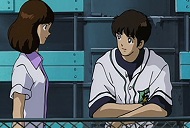
Touch 5: Cross Road
It's really hard to close a series well. I can list a lot of really good final movies that just don't quite reach "great." Return of the Jedi, The Godfather III, The Matrix Revolutions...even The Return Of The King, one of the best closing chapters in filmic history, had a couple endings too many. And when it comes to Touch: Cross Road, the same is true. Those who weren't happy with the lack of baseball action in the fourth film in the Touch series, Miss Lonely Yesterday, should be pleased that the vast majority of this entry takes place on the diamond. To accomplish that, the romantic plot so important the last go-around winds up in the backseat, and while this is a solid effort, I could have used more closure.
A Greyhound bus cuts across endless miles of American interstate. Our hero Tatsuya has put as much physical distance as he can between himself and his homeland (and the ghost of his brother) as he travels to play for a tiny ball club on the brink of bankrupcy. You've heard of triple-AAA ball where guys get ready to head to the major leagues? Well, this is single-A, the place where you either develop your skills to climb the ladder of baseball success or abandon all hope of playing professionally. Tatsuya's team can barely get a hundred people to fill the stands, and they're so bad that those folks aren't getting their money's worth. While Tatsuya's determination and spirit help bring the rest of the players up to his level, he'll be lucky to ever get noticed in this backwater.
Meanwhile, Minami works back in Japan as a photographer's assistant, occasionally taking a picture or two but mostly preparing countless cameras and lenses for her boss to use at just the right time. She's good at it, but her heart's in the States with Tatsuya, and her work suffers as she longs to be the man she loves. He calls from time to time, and he's only got eyes for her...but while their love remains strong, their future is as uncertain as Tatsuya's baseball career.
Perhaps the best way to view this film is not as a separate entity from Miss Lonely Yesterday at all. Since both films were shown within a year of each other (and well after the original trilogy debuted), I believe they were meant to be complementary. Certainly the visuals are much the same across both, though I found this film with its many new players to have more consistent character design. (I think perhaps it was difficult the first go-around to adapt the unique but striking character visuals to a modern style.) While the production standards are at a high TV level circa 2000 and not striking, I did want to note the music. J-Pop has a bad habit of aging quickly, but the songs chosen for this film go for a more acoustic sound and still work for the viewer 10 years later.
The most enjoyable aspect of Cross Road for an American viewer like me is seeing this country portrayed in a Japanese film from a Japanese mindset. While certain things are intentionally changed for copyright purposes -- there's every alternate spelling you can think of for Budweiser in this film -- there's a real attempt to capture the feel of an American ballpark. It succeeds often, even if the "Engrish" is hysterical in its ineptness. There's something quite odd about a film set in America where everybody speaks Japanese, and sometimes certain actions of the players don't reflect what any normal American would do, but it's a minor point. When this film was made, I don't think the animators expected any actual Americans to see it!
I'm somewhat ambivalent about the core of the film, but not because it isn't an enjoyable watch. These folks have long since become fictional friends in my mind, and I liked seeing them again. But that's the issue: I see Touch as a human story against a baseball backdrop, not the other way around. The center of that human story is the complicated relationship between Tatsuya and Minami, and that's somewhat lacking. While these two aren't engaged, at the end of the last film they confirmed their commitment to one another. Cross Road doesn't ignore the frustration of the long-distance relationship, but the pain of it isn't as palpable as it should be. At the same time, it's not very fulfilling for the lead characters not to appear together in the same place but for a few moments. There's also a secondary story about a tomboy who falls for Tatsuya, but anyone who's watched the rest of this series knows that he's such a kindhearted, loyal fellow that the idea of him being lured into cheating on Minami is ludicrous. The filmmakers know this too, so the plotline doesn't add tension to the story.
But those issues will not matter to those who wanted to see Tatsuya get back on the mound. That he does, and while saving a tiny ballclub from bankruptcy isn't nearly as exciting as getting to the "world series" of Japanese baseball, it works. The new characters are more fully-formed than one might expect. There's also a certain nostalgia captured here, as the waning of baseball in America is juxtaposed with the fandom in Japan. If Cross Road fudges a little on the romance, it gets the rest mostly right.
In the final analysis, even though the literal finale is ambiguous concerning our stalwart couple, there is no doubt how everything will turn out. Does that make for an exciting conclusion? Not exactly. But am I satisfied? Yes. While I would love to see the saga completed with a wedding and a big-league contract and all, that's not a reality, seeing that this film was released over ten years ago. If you're like me and you've worked your way through the Touch films, you might be a little disappointed that this is all there is...but you'll have enjoyed the journey enough to be thankful you took it.
Touch 5: Cross Road -- minor language -- B+

